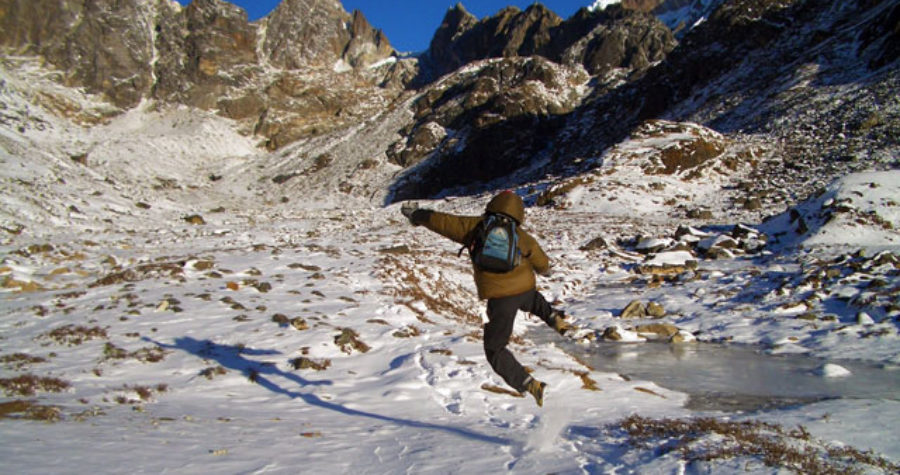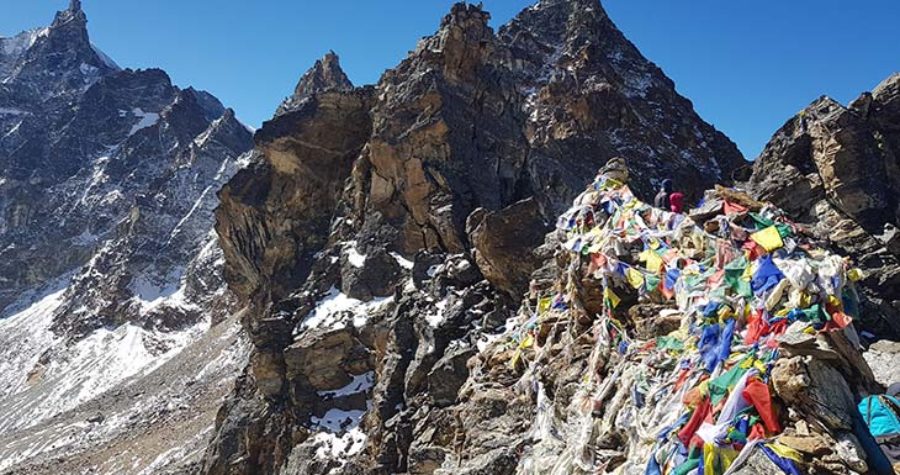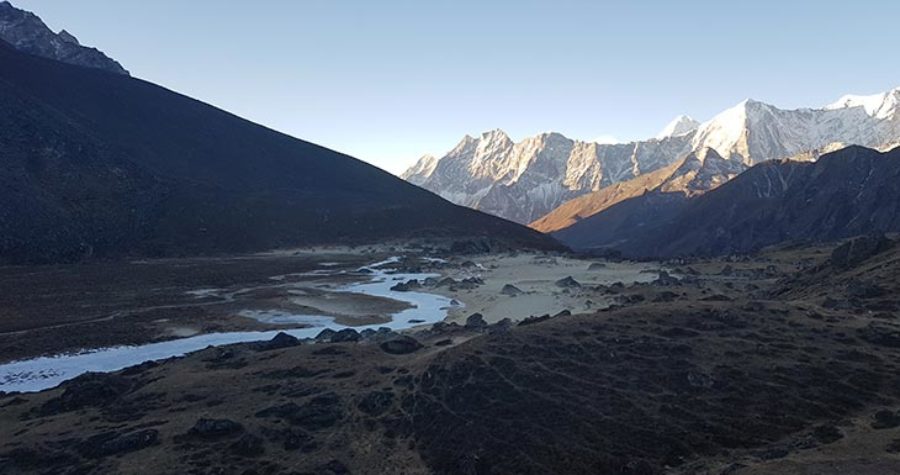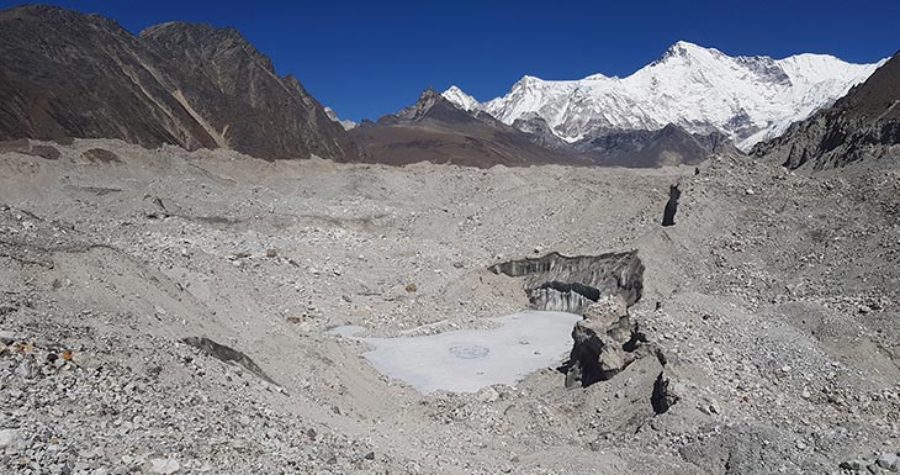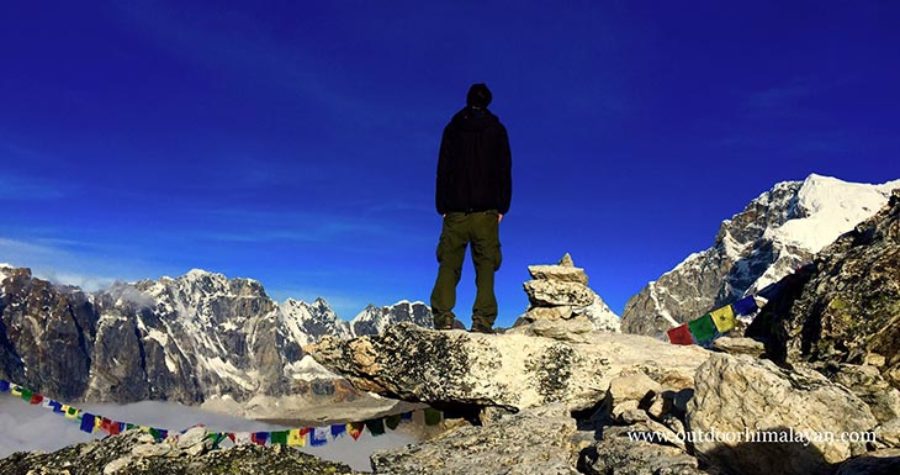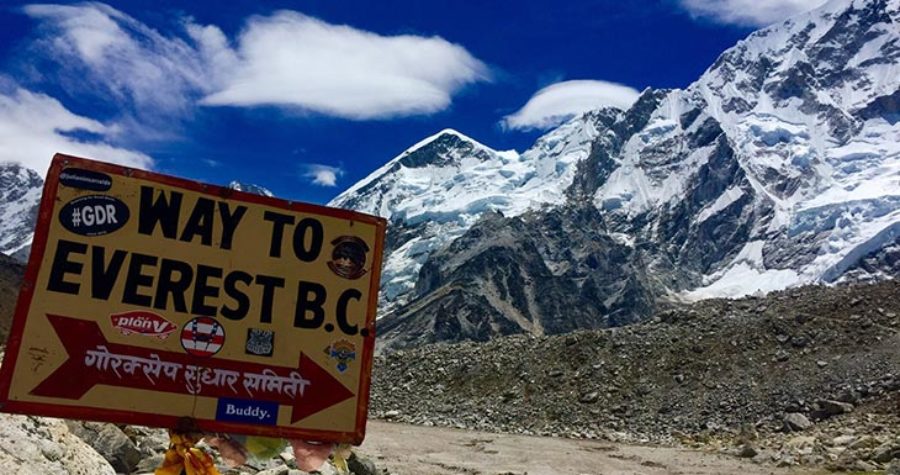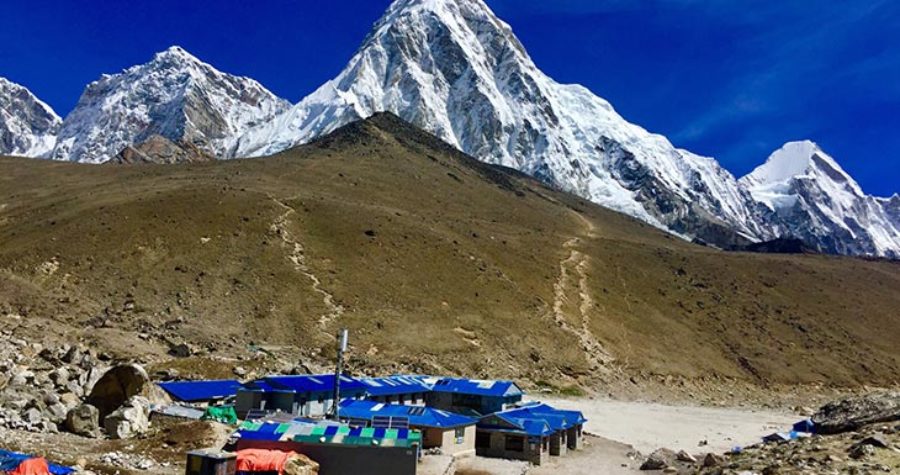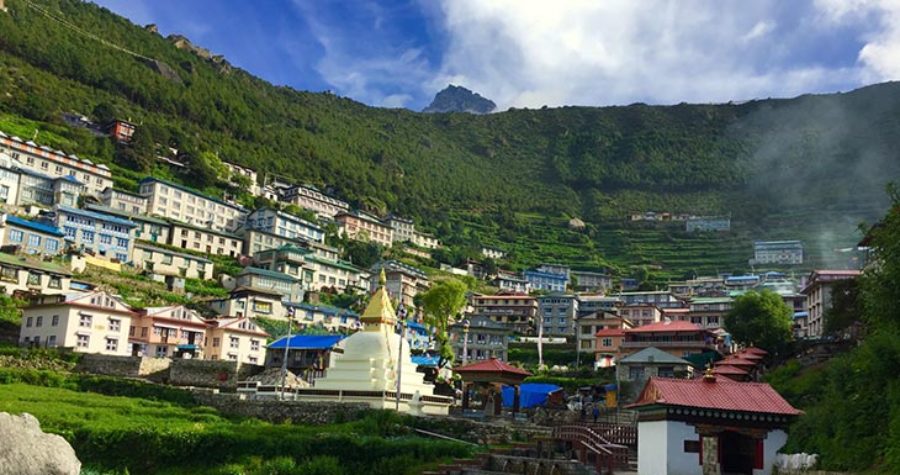Trip Highlights
- Traverse the High Pass Cho La (5,420m)
- Everest Base Camp (5,364m) and Kalapatthar viewpoint (5644.5m)
- Massive Ngozumpa Glacier
- An incredible panoramic view of the Khumbu Himalayas
- Mesmerizing Gokyo Lake and superb Gokyo Ri
- Attractive Khumjung village and other Sherpa settlements
- Impressive views of Everest, Makalu, Cho-Oyu, Gychung Kang
- Sherpa locals, lifestyle, and culture
trip Overview
Everest Base Camp via Cho La Pass trek is a full-fledged adventure trek over the challenging terrains of the Himalayas of Nepal in the vicinity of Mt Everest. The trek combines most of the spectacular vantage points falling in the Everest region. After we reach Namche Bazaar, we move on to Tengboche, Dingboche, Lobuche, Gorakshep, and Kalapatthar. Then we backtrack a little to Lobuche and head on to Zongla; from where we cross the formidable Cho La Pass to reach Gokyo on the other side. Then climb Gokyo Ri and return to Namche via Dole. Although you do not climb Everest during this trip, you will perfectly find out where is Mt Everest, and how it looks; and having observed it from different angles and having known its surroundings in detail.
Everest Base Camp via Cho La Pass is certainly a difficult trek, but you should know that even the easiest of the treks in the Everest region gives you a tinge of adventure with high-altitude hikes as well as steep walks up and down. Despite its difficulties, the rewards of this trek stand high over its hazards; thus inspiring the ever-larger number of intrepid trekkers to face the challenges head-on.
Not only do they enjoy awesome mountains and their incredible panorama from every stopover; but they do test all fiction and facts about Mt Everest and the Everest region first-hand. They also get a chance to familiarize themselves with the Sherpas and their ways of life. As you take the trek, you will follow the famous “Everest Trail” trek to the prosperous village of Namche Bazaar and onwards; and also trek alongside the torrential Imjatse River to the high valley below Mt. Everest. Embark on this trip with a brave heart; you will certainly get a boost to your morale.
Besides, you will set your definition and measurement of the most beautiful sceneries of the earth. Take pictures of Mt Everest and other beautiful mountains and peaks and see how they look when you reach home! All in all, this trek distills most of the attractions and most of the challenges attending to any of your venturesome forage into the Everest Region.
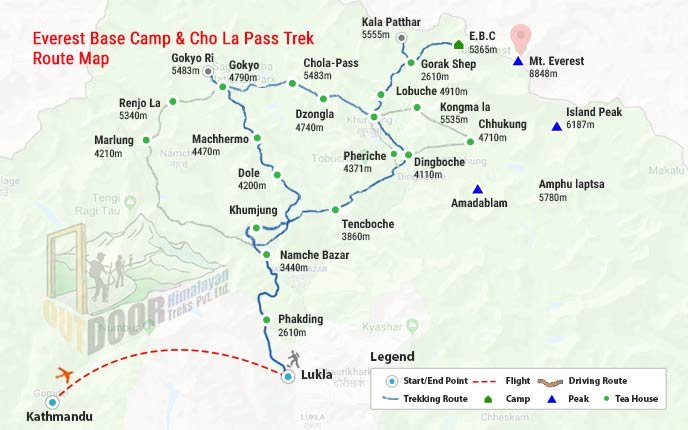
Itinerary
30 Minutes Hotel
We will pick up from Kathmandu Airport, Transfer to the Hotel, it takes about 30 minutes from airport to hotel in Thamel. after that easy and free evening yourself.
5-6 hrs Hotel
We will do paper works, make the permits, introduce the Guide, at the same time if you wish, you can do Kathmandu valley full day sightseeing (UNESCO world Heritage sites) with private transportation and English speaking tour guide with an Extra cost.
45 min/4 hrs Lodge
Our guide will pick you up at 5:30 AM from your hotel in Kathmandu and drive to the airport. You will board the early morning flight at 6:30 AM from where you will fly to Lukla (2860 m.) in about 45 minutes.
After breakfast in Lukla, you will walk for about 4 hours to Phakding (2610 m.), a fairly plain terrain inhabited by Sherpas. Later in the afternoon, you will follow upstream Dudhkoshi River and spend the night in a lodge.
6-7 hrs Teahouse
You will trek for nearly seven hours to reach Namche Bazaar (3440 m.), the famous town in Solukhumbu. The last three hours of this trek will be tough, but the beautiful sceneries on the way will make you will forget your tiredness. The night will be spent in a local teahouse.
5-6 Hrs Teahouse
To help your body adjust with the high altitude conditions, we will spend the day for acclimatization. You can do some daytime hiking and explore Khumjung village and return to the teahouse at Namche Bazaar for the night-stay.
6-7 hrs Lodge/Teahouse
After a six to seven hours trek, you will reach Tengboche (3867 m.), a perfect viewpoint to observe beautiful peaks of Ama Dablam and the picturesque Thamserku, and a greater part of the Himalayan range in the Khumbu Region.
6-7 hrs Teahouse
Dingboche (4250 m.) lies at about a walking distance of six to seven hours from Tengboche. Due to the rising altitude, you will be walking slower than on previous days.
6 Hrs Teahouse
This will be the second day of acclimatization. You will be taken on a day trip to Chhukung Valley and back to Dingboche. Rest and rejuvenation are quite essential for you in order to continue the trekking next day. High altitude treks are usually carried out along with acclimatization in parallel. It is necessary for your body to be familiar with the surrounding altitudes. Frequent acclimatization is a must, and your guides will encourage it.
5-6 hrs Teahouse
Your next stopover is Lobuche (4950m.), at about a walking distance of five to six hours from Dingboche. Stunning views of Mt. Pumori, Mt. Ama Dablam, Mt. Lhotse and a section of the Himalayan Range are the main highlights of the day.
3-4 hrs Teahouse
The next segment of your trek, from Lobuche to Gorakshep (5170 m.) is short and can be completed in about three to four hours. You will reach Gorakshep just in time for lunch. After resting for a few hours, you will take a walk to Everest Base Camp (5364 Mtrs) in the evening, to view the dazzling sunset over the Himalayas ranges.
5 hrs Teahouse
You will begin the five hours’ hike to Kalapatthar early in the morning. Kalapatthar is at an altitude of 5644.5 meters above sea level, and is better known as the perfect viewpoint to see all major parts of the Himalayan Range, including the majestic Mt. Everest. If the weather permits, you will get to see a spellbinding sunrise, something that you will not find elsewhere in the whole world. You can take as many photographs as you like, and then go back to Gorakshep for lunch. Shortly afterwards, you will descend back to Lobuche.
5-6 hrs Teahouse
You will trek to Zongla (4740 m.) which is about five to six hours walk from Lobuche. Later will you will cross the Cho-La Pass. Zongla is the only one place where you can spend a night. At night your stay at a cozy teahouse is made enjoyable by the mingling of people coming from all over the world.
6-7 hrs Teahouse
You will walk from Zongla to Cho-La Pass (5420 m.), and then trek down to Thanga (4500 m.). It is a long pass difficult to cross even in summer when the snow levels are low; while in winter it is even more difficult to travel, due to almost incessant snowfall. However, during rest of the seasons, you will find the walk over the glacier enjoyable. As night falls, you will hurry towards the indoor warmth of a comfortable teahouse.
4-5 hrs Teahouse
Trek to Gokyo (4790 meters). This will be a short walk comprising only 4 - 5 hours after which you will arrive in Gokyo just in time for lunch. You can then explore the beautiful Gokyo valley, while at night you stay at a tea house. From your room, you can see the lake view.
3-4 hrs Teahouse
On this day early in the morning we have steep climb up to the top of Gokyo Ri (5357m). Ample rewards await one who attempts this trip. There are stunning views of the upper Gokyo valley, the massive Ngozumpa Glacier and an incredible panoramic view of the whole Khumbu Himalayas, such as, giants as Everest, Lhotse, Nuptse, Makalu (8481m), Cho-Oyu (8153m) and Gychung Kang (7922m) can be seen. Those who explore the glacier and Gokyo Peak are rewarded. The rest of the day is for acclimatization and late in the afternoon we go back to the camp.
5-6 hrs Teahouse
The trail from Gokyo to Dole is downhill, where you can enjoy the beautiful views along the way and compare the differences in between up-hill and down-hill walks. It is an enjoyable day for you since the pace is slow and you can take some nice snaps. Your over-night stay is at a tea house.
6 hrs Teahouse
Dole to Namche Bazaar is about six hours walking trip. You cross the Khumjung village on the way along the footsteps of the amazing Ama Dablam to get to Namche Bazaar. Your overnight stay is at a comfy teahouse.
7 hrs Lodge
You are almost nearing the end of the trek on day 16. This is the last day of your Trek, During the day time, you will trek down to Lukla, which normally takes about 7 hours. You will have some time to spend in Lukla during the evening, so you can either hop in a local pub for a drink or else you can spend the evening in your lodge interacting with the locals.
45 min Hotel
Early in the morning you will be preparing for your flight back to Kathmandu. During your 45 minute flight you can hit that Play button on your camera and review the trip you just had in the past amazing seventeen days. A nostalgic feeling of loneliness will fill you as you descend upon Kathmandu. However the hustle and bustle of Kathmandu along the way, as you transfer to your hotel in Thamel or elsewhere in Kathmandu, will charge you for yet another adventure in Nepal. Evening join live Typical Nepali Cultural dinner host by Outdoor Himalayan Treks.
Why book with us?
Outdoor Himalayan Treks, Founded by professionals with long experience in adventure and community-based tourism, the company is dedicated to delivering high-quality service to its clients.Experiences since 2004, 50% Repeated customers, Awarded on TripAdvisor
What's included
- Accommodation: Basic teahouse accommodation during the trek (Toilet and bathroom will be outside of the room; Deluxe accommodation for 3 nights in Kathmandu on a sharing basis.
- Meals: 3 meals per day (breakfast, lunch, and dinner) which you can choose from the menu) during the trek; breakfast in Kathmandu.
- Transportation: Kathmandu-Lukla-Kathmandu flight, Airport - hotel - airport transfers by private transport.
- Documentation: Trekking permit ( Sagarmatha National Park permit), and Khumbu entry permit.
- Equipment/Accessories: If required, we will provide you with a down jacket and sleeping bags (Which you can return to us after the trek), a first-aid kit, a water purifying solution (iodine-based)
- Human resource: A professional and experienced trekking guide (English-speaking); a porter per two trekkers (carrying up to 25 kg); all the expenses for the guide and porter(s) are covered (wages, accommodation, meals, transportation, insurance, etc.)
- Tax/Service Charge: All applicable taxes, service charges, or fees. We hereby guarantee you no 'hidden charges' afterward.
- Complimentary: Farewell dinner in Kathmandu (authentic Nepalese cuisines with live cultural show)
- Emergency Rescue Service: Should an emergency arise during your trek, we will provide prompt and professional rescue and medical services. However, you must be already insured for such emergencies, and your insurance policy must cover helicopter evacuation (Kindly make sure that the policy covers up to 5650 Meters). Moreover, you should provide your policy details and authorize us to deal directly with your insurance company on your behalf.
What's not included
- Beverage (tea/coffee, Bottled mineral water, cold/alcoholic drinks, etc.)
- Any other expenses of a personal nature (extra meals/snacks/desserts, battery charging fees, photography charges, Hot Shower, Wi-Fi, laundry, Phone calls, etc.)
- Tips for Guide/Porters (Expected) and any type of donations
- Your travel insurance
- Nepal Visa
- International airfares
- Extra night accommodations in Kathmandu due to early arrival, late departure, incompletion of trekking due to your cause, etc.
- Lunch and dinner in Kathmandu Excess baggage cargo charge (On the domestic flight, the airlines allow 15 kilos, if have more than 15 kilos you are required to pay an additional charge of approx. USD 1 per KG)
- Any other services than mentioned in the inclusion section.
Guidelines
Accommodation
Teahouses or Lodges are accommodation types during the Everest Base Camp via Cho La Pass trek that provide basic facilities but are comfortable to stay in. Generally, bathrooms are inside the teahouses except in the higher regions. During the peak season, room sharing must be done. Read More
Meals
3-course full board meals are served during the Everest Base Camp via Cho La Pass trek which is healthy and hygienic. Breakfast and dinner are served from the teahouses and lunch is served at the stopovers during the trek. Trekkers can munch on bakery items, continental foods, and coffee in Namche. Read More
Drinking water
Drinking water during the Everest Base Camp via Cho La Pass trek is easily available. Trekkers can buy Mineral Water, fill tap water, or boiled water at teahouses as their preference. Read More
Transportation during the Everest Base Camp via Cho La Pass
- Kathmandu-Lukla-Kathmandu flight
Best Time for Everest Base Camp via Cho La Pass Trek
The ideal seasons for the Everest Base Camp via Cho La Pass Trek are Spring (Mar-May) and Autumn (Sep-Nov) as the weather and temperature are stable and offer incredible vistas. Read More
Trekking Permits for Everest Base Camp via Cho La Pass Trek
Everest Base Camp via Cho La Pass Trek requires compulsory two permits i.e. Sagarmatha National Park (SNP), and Khumbu Pasang Lhamu Rural Municipality. Read More
Everest Base Camp via Cho La Pass Trek Difficulty
Everest Base Camp via Cho La Pass trek is a difficult-graded trek with a maximum elevation of 5,644.5 m. Walking daily long hours on the steep ascending and descending rough trails and gaining altitude can be challenging for trekkers. Read More
Altitude Sickness in Everest Base Camp via Cho La Pass Trek
The maximum elevation during the Everest Base Camp via Cho La Pass trek is 5,644.50 m (Kalapatthar). As the elevation gains, there is a high chance of getting altitude sickness. Thus, acclimatization rest is essential to prevent it. Read More
Fitness Level
Everest Base Camp via Cho La Pass trek demands trekkers to have top-notch fitness levels. Trekkers should be physically and mentally sound to join this trek. With proper preparation, physical fitness, and acclimatization, it is achievable. Read More
Skills
Your familiarity with the mountainous terrain and previous trekking experience will be plus points.
Travel Insurance
It acts as a safety net and is essential for trekking. We recommend getting travel insurance from a reputed company.
- Make sure that you are insured against cancellations, accidents, health, emergency evacuation and loss, theft of, or damage to, baggage, and personal effects.
- In emergencies, we will arrange for a helicopter rescue, medical treatment, and aftercare for you. All these costs shall be borne by your travel insurance company.
Required Equipment/Gears
Everest Base Camp via Cho La Pass is a difficult-graded trek. Thus, it requires standard equipment and gear that trekkers can hire or bring on their own. Read More
Documents required
- Scanned copies of passport-sized photos and passports of each participant
- Travel Insurance
- Sagarmatha National Park Permit
- Khumbu Pasang Lhamu Rural Municipality Permit
- TIMS
FAQs
Where is Cho La Pass situated?
Cho La Pass lies in the Solukhumbu district on the Gokyo Pass trail at an elevation of 5,420 m.
What is the duration for the Everest Base Camp via Cho La Pass trek take?
The Everest Base Camp via Cho La Pass trek duration usually takes around 18 to 20 days to complete, including acclimatization days and time for exploring the base camp area.
Is prior trekking experience necessary for the Everest Base Camp via Cho La Pass trek?
Yes, prior trekking experience is highly recommended for the Everest Base Camp via the Cho La Pass trek, as it involves crossing a challenging high mountain pass and trekking at high altitudes.
What is the difficulty level of the Everest Base Camp via Cho La Pass trek?
The Everest Base Camp via Cho La Pass trek is considered a strenuous and challenging trek. It requires good physical fitness, endurance, and the ability to trek at high altitudes.
When is the best time to do the Everest Base Camp via the Cho La Pass trek?
The best time to undertake the Everest Base Camp via Cho La Pass trek is during the Spring (Mar-May) and Autumn (Sep-Nov) seasons when the weather is favorable, and the trails are more stable.
What permits are required for the Everest Base Camp via Cho La Pass trek?
The Sagarmatha National Park entry permit, Khumbu Rural Municipality Permit, and the TIMS (Trekkers Information Management System) are required for the Everest Base Camp via the Cho La Pass trek.
What is the maximum altitude reached during the Everest Base Camp via the Cho La Pass trek?
The maximum altitude reached during the Everest Base Camp via the Cho La Pass trek is Kalapatthar at an elevation of 5644.5m.
What are the accommodation types during the Everest Base Camp via Cho La Pass trek?
Accommodation types during the trek are teahouses or lodges along the trail that offer basic amenities such as beds, blankets, and meals.
Is the drinking water safe during the Everest Base Camp via the Cho La Pass trek?
Yes, the drinking water is safe but it is recommended to drink bottled or purified water during the trek to avoid the risk of waterborne diseases. For safety, carry a water bottle, and water purification tablets.
What kind of food is available during the trek?
The teahouses and lodges on the Everest Base Camp via the Cho La Pass trek route serve a variety of meals, including traditional Nepali dishes, and Tibetan cuisine, as well as international options like pasta and pancakes.
Are there any toilet facilities along the trail?
Yes, most teahouses and lodges have basic toilet (squat style) facilities. However, they may be shared and not always equipped with modern facilities.
Is it possible to charge electronic devices during the trek?
Yes, you can find charging facilities at an additional cost in most teahouses along the Everest Base Camp via the Cho La Pass trek route. However, it is advisable to carry spare batteries or power banks as a backup.
How can a porter be of help for the Everest Base Camp via the Cho La Pass trek?
A porter helps to carry your backpack, which can be arranged through trekking agencies or directly with the teahouses. It allows you to trek freely and without load.
Is a guide necessary for the Everest Base Camp via the Cho La Pass trek?
Yes, hiring a knowledgeable guide is highly recommended for the Everest Base Camp via the Cho La Pass trek. They can provide valuable assistance, and navigation support, and share insights about the region.
Is travel insurance necessary for the Everest Base Camp via Cho La Pass trek?
Yes, it is highly recommended to have travel insurance that covers trekking activities, including medical emergencies and helicopter rescue services, in case of any unforeseen circumstances.
What kind of weather can I expect during the Everest Base Camp via Cho La Pass trek?
You can expect moderate temperatures during the day and colder temperatures at night in the Everest region. It is essential to dress in layers and be prepared for changing weather conditions.
How can I prepare for the altitude during the Everest Base Camp via the Cho La Pass trek?
To prepare for the altitude, it is recommended to engage in regular exercises before the trek, stay hydrated, ascend gradually, and take acclimatization days to allow your body to adjust to the increasing altitude.
What should I pack for the Everest Base Camp via the Cho La Pass trek?
Some essential items to pack include sturdy trekking boots, warm clothing, a down jacket, a hat, gloves, sunglasses, a backpack, a water bottle, sunscreen, and a first aid kit. Your trekking agency also provides you with an essential packing list.
CANCELLATION
- Free cancellation up to 60 days prior departure
- 30% of the total cost of the trip will be charged if cancelled between 60 to 30 days prior to departure date
- 60% of total cost of the trip will be charged if cancelled in between 30 to 14 days prior to departure date.
- No refund will be provided if cancelled within 14 days prior of departure date.
- No refunded will be provided if the guest will not show up.
- Regrettably, in case where the trek/tour can not be completed due to customer's own problem or sickness or unfavourable weather there will be no refund.
- If the trekking/tour is extended more than given itinerary extra charge will be applied accordingly
- If the agreed trip can not be organised due to bad weather or any unforeseen events, similar trip will be organised (in the mutual understanding with the travellers)



